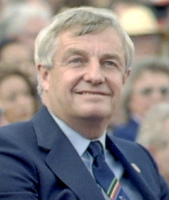 The National Energy Program was an energy policy of the Canadian federal government from 1980 to 1985. Meant to give Canada energy independence, it was strongly opposed by the private fossil fuel energy sector and the oil-producing Western Canadian provinces, most notably Alberta. The NEP was a Canadian response meant to address concerns by leaders of developed countries regarding the recession that followed both oil crises of the 1970s. These were world-wide problems. Here in Canada the Bank of Canada reported that economic problems had grown as a result of the oil crises, with high rates of unemployment, and inflation rising dramatically to between 9% and 10% annually. Prime interest rates were over 10%. By the end of the 1970s, diminishing supplies of available oil due to wars in the Middle East, coupled with skyrocketing OPEC oil prices, had far-reaching effects on producers, consumers, and the oil industry itself. In his State of the Union Address in January 1980, US President Jimmy Carter described how his country's "excessive dependence on foreign oil is a clear and present danger," and he called for a "clear, comprehensive energy policy for the United States." After the first OPEC price shock in 1973, Canada's federal government 'broke the link' between domestic prices and international prices. 'Made-in-Canada' prices for crude oil were meant to protect Canadians across the country from the whims of the world oil market and to provide producers with enough incentives to develop new energy resources.  The energy policy was created under the Liberal government of Prime Minister Pierre Trudeau in 1980 as a response to those two oil crises of the 1970s.
The energy policy was created under the Liberal government of Prime Minister Pierre Trudeau in 1980 as a response to those two oil crises of the 1970s. The NEP had three main objectives: The NEP was also intended to:  The NEP became a highly controversial policy, creating intense opposition and anger in Western Canada, particularly in Alberta. The province's premier, Peter Lougheed, vehemently opposed the policy, claiming that it interfered with provincial jurisdiction and unfairly deprived Alberta of oil revenue.
The NEP became a highly controversial policy, creating intense opposition and anger in Western Canada, particularly in Alberta. The province's premier, Peter Lougheed, vehemently opposed the policy, claiming that it interfered with provincial jurisdiction and unfairly deprived Alberta of oil revenue.In 1981, Lougheed and Trudeau reached a revenue-sharing agreement after Lougheed threatened to reduce oil production in Alberta. Despite this, the policy would continue to have repercussions in the western provinces. The term 'Western alienation' was coined as a result of the NEP. With natural resources falling constitutionally within the domain of provincial jurisdictions, many Albertans viewed the NEP as a detrimental intrusion by the federal government into the province's affairs. Particularly vilified was Prime Minister Pierre Trudeau, whose Liberals had no seat west of Manitoba. A popular western slogan during the NEP, appearing on many bumper stickers, was "Let the Eastern bastards freeze in the dark." Due to the policy, the unemployment rate in Alberta rose from 3.7 percent to 12.4 percent, the bankruptcy rate in Alberta rose by 150 percent, and Alberta's losses were estimated to be between $50 billion and $100 billion. Alberta still initially enjoyed huge economic surpluses due to high oil prices, a fact that lead to anger with Alberta in eastern Canada, where Albertans were seen as greedy and unwilling to help share their wealth with the rest of the country. However, these surpluses were heavily reduced by the NEP, which, in turn, hindered many of Lougheed's policies for economic diversification to reduce Alberta's dependence on the cyclical energy industry, such as the Alberta Heritage Savings Trust Fund. It also left the province with an infrastructure deficit. In particular, the Alberta Heritage Fund was meant to save as much of the earnings during high oil prices to act as a 'rainy day' cushion if oil prices collapsed because of the cyclical nature of the oil and gas industry. The NEP was one reason that the fund failed to grow to its full potential. The rationale for the program weakened when world oil prices began a slow decline in the early 1980s. The policy was eventually repealed by the newly-elected Progressive Conservative government of Prime Minister Brian Mulroney on June 1, 1985. Meanwhile, the NEP contributed to the creation and rise of the Western Canadian-based and right-wing populist Reform Party, which made a major breakthrough in the 1993 federal election; the Reform Party merged with the PCs in 2003, becoming the Conservative Party which governed Canada from 2006 to 2015. |